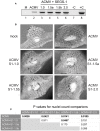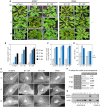SEGS-1 a cassava genomic sequence increases the severity of African cassava mosaic virus infection in Arabidopsis thaliana
- PMID: 37915512
- PMCID: PMC10616593
- DOI: 10.3389/fpls.2023.1250105
SEGS-1 a cassava genomic sequence increases the severity of African cassava mosaic virus infection in Arabidopsis thaliana
Abstract
Cassava is a major crop in Sub-Saharan Africa, where it is grown primarily by smallholder farmers. Cassava production is constrained by Cassava mosaic disease (CMD), which is caused by a complex of cassava mosaic begomoviruses (CMBs). A previous study showed that SEGS-1 (sequences enhancing geminivirus symptoms), which occurs in the cassava genome and as episomes during viral infection, enhances CMD symptoms and breaks resistance in cassava. We report here that SEGS-1 also increases viral disease severity in Arabidopsis thaliana plants that are co-inoculated with African cassava mosaic virus (ACMV) and SEGS-1 sequences. Viral disease was also enhanced in Arabidopsis plants carrying a SEGS-1 transgene when inoculated with ACMV alone. Unlike cassava, no SEGS-1 episomal DNA was detected in the transgenic Arabidopsis plants during ACMV infection. Studies using Nicotiana tabacum suspension cells showed that co-transfection of SEGS-1 sequences with an ACMV replicon increases viral DNA accumulation in the absence of viral movement. Together, these results demonstrated that SEGS-1 can function in a heterologous host to increase disease severity. Moreover, SEGS-1 is active in a host genomic context, indicating that SEGS-1 episomes are not required for disease enhancement.
Keywords: ACMV; Arabidopsis thaliana; SEGS-1; begomovirus; cassava.
Copyright © 2023 Rajabu, Dallas, Chiunga, De León, Ateka, Tairo, Ndunguru, Ascencio-Ibanez and Hanley-Bowdoin.
Conflict of interest statement
The authors declare that the research was conducted in the absence of any commercial or financial relationships that could be construed as a potential conflict of interest.
Figures




References
-
- Abbas Q., Amin I., Mansoor S., Shafiq M., Wassenegger M., Briddon R. W. (2019). The Rep proteins encoded by alphasatellites restore expression of a transcriptionally silenced green fluorescent protein transgene in Nicotiana benthamiana. Virusdisease 30, 101–105. doi: 10.1007/s13337-017-0413-5 - DOI - PMC - PubMed
LinkOut - more resources
Full Text Sources

